On Christmas Eve I flew from London to Beirut on BA and landed
during a spectacular thunderstorm. I managed to get in for free
after buying a visa at the airport bank for $18, the immigration
man said it's free today, go, and get your money back, so we
did! By total coincidence, the next morning the first person I
saw at breakfast was Katerina, a fellow Globetrotter from London!
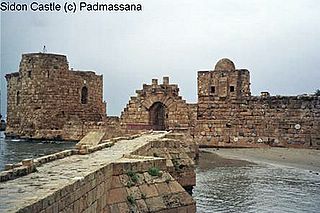 I was part of an organised tour of the Lebanon and
there were 10 of us. We left Beirut on Xmas day and headed south
via the Corniche to the port city of Sidon. On the way we passed
near to the sports complex behind which there are massive Shatila
and Shabra Palestinian refugee camps, where the massacres in the
1980's happened. In Sidon we visited the Caravanserai where
there is a collection of photographs showing the hours leading up
to and the assassination of president Hariri in February 2005;
the devastation from the 350kg car bomb has to be seen to be
believed.
I was part of an organised tour of the Lebanon and
there were 10 of us. We left Beirut on Xmas day and headed south
via the Corniche to the port city of Sidon. On the way we passed
near to the sports complex behind which there are massive Shatila
and Shabra Palestinian refugee camps, where the massacres in the
1980's happened. In Sidon we visited the Caravanserai where
there is a collection of photographs showing the hours leading up
to and the assassination of president Hariri in February 2005;
the devastation from the 350kg car bomb has to be seen to be
believed.
Also in Sidon we saw the Crusader castle which is reached by a
stone bridge across the sea. The castle is well preserved and
there are lots of towers and ramparts to explore, though at lower
levels of the castle we had to avoid the massive waves that were
breaking over the castle. In Sidon we also visited, the market
and the soap museum, which is quite interesting.
Our next stop was the drive up into the Chouf mountains to Deir
el Qamar to our Auberge, a lovely place to stay run by an
eccentric old French lady who had a roaring log fire, just as
well as it was very cold. Our Christmas dinner was a meze: loads
of meat and bread, etc, very nice, and no sheep's eye balls
to be seen. (My mother had predicted a Christmas dinner of
sheep's eye balls)! 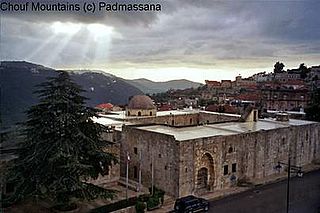
We had planned to go walking in the Cedar forest, but the rain in
Beirut had been 3ft of snow in the mountains so that was
abandoned. The snowy trip over the mountains into the Bekaa
valley was precarious and our driver had to be careful not to hit
parked vehicles that you couldn't see as they were buried in
snow. On the other side of the mountains we visited the Ummayad
ruins at Anjar which borders Syria, but again it was raining, so
we saw the main buildings and temples, but it was too cold too
really take our time, so after a chicken shawarma and chips it
was up into “Hezbollahville”, aka Baalbeck, famous for
its fantastic ruins.
Our hotel was right opposite the ruins, and pretty spectacular
they are too. We had a local guide to take us round, as Baalbeck
is quite a big place, and also home to Hezbolah. There were
yellow signs showing a fist with a Kalashnikov all over the place
and local people try to sell you Hezbolah flags and t-shirts and
there are people collecting for the cause. I had a wander around
Baalbeck in the evening, a nice place and despite those that run
it, it was not in the least threatening, bought some sweets off
an ex-Australian Lebanese who called me “mate”!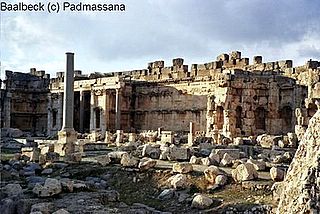
We were supposed to go straight to the Qadisha valley from
Baalbeck, but because of the holiday weekend we had not visited
Beit Eddin, due to it being Christmas day on the Sunday and the
day off for public building employees on the Monday. Beit Eddin
is a fantastic palace, very much in the style of the Alhambra in
Granada, lovely architecture, beautiful fountains and gardens. We
had to make quite a detour to this, but it was well worth it, we
then skirted back around Beirut and then up to Byblos on the
coast.
Byblos or Jbail to give it its proper name has some nice Roman
ruins and a castle. It was also where our guide Nasim lives so as
there were only 10 of us we went round his house for tea and
cakes with his sister and Father, which was nice. During that
night the PFLP (Peoples Front for the Liberation of Palestine)
lobbed a couple of Katusha rockets over the border into Israel, a
while later 30 miles south of us the Israeli air force bombed a
Palestinian camp in South Beirut, we heard “something”
in the night but didn't find out what had happened until the
next morning.
Went next to Tripoli, a lovely old city by the sea, fantastic
castle to clamber over, ramparts giving great views with sheer
drops off the side, in Europe there 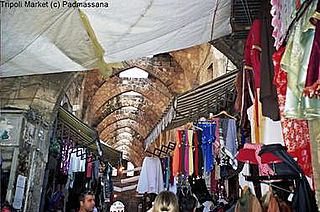 would be “Don't climb the
ramparts” signs and a huge big fence to stop you, not in
Lebanon, go where you like and we did.
would be “Don't climb the
ramparts” signs and a huge big fence to stop you, not in
Lebanon, go where you like and we did.
Then went down into the market great fun eating hot bread
straight from the bakers. We got into the big mosque too. I love
the architecture of these places, the girls with us were given
all covering pink robes, looked like a day out for the KKK or a
bunch of druids at the Solstice. Then we drove into the mountains
to Bcharre, home to the writer/painter Gibran. His stuff is not
my kind of thing and there's no chance of it ever touring
Saudi Arabia or Iran as nobody in his pictures has a stitch on
and as for what they are getting up to…..After a quick look
round we came out and built a snowman and had a snowball fight!
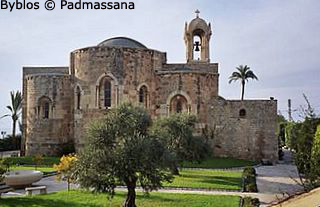 We spent the night in an Hermitage called St
Elysee, whose back wall is actually the rock of the mountain
behind. To get to the place we had to go down a steep mountain
road that was a sheet of ice – which was exhilarating, but the
next day we had to come out by the same way and ended up using
snow chains and taking runs at bends to get round them. We were
also supposed to do a walk here, but were forewarned about the 12
inches of mud and 2 ft of snow by another group that had tried
the walk and had to give up. Instead we went to Byblos for lunch
and then down to Jeita Grotto, a fantastic series of caves which
were brilliant. After the caves we went to Jounie and got the
cable car and funicular up to the top of the hill behind the
town, which has a giant statue of the Virgin Mary, but we just
made it for sunset.
We spent the night in an Hermitage called St
Elysee, whose back wall is actually the rock of the mountain
behind. To get to the place we had to go down a steep mountain
road that was a sheet of ice – which was exhilarating, but the
next day we had to come out by the same way and ended up using
snow chains and taking runs at bends to get round them. We were
also supposed to do a walk here, but were forewarned about the 12
inches of mud and 2 ft of snow by another group that had tried
the walk and had to give up. Instead we went to Byblos for lunch
and then down to Jeita Grotto, a fantastic series of caves which
were brilliant. After the caves we went to Jounie and got the
cable car and funicular up to the top of the hill behind the
town, which has a giant statue of the Virgin Mary, but we just
made it for sunset.
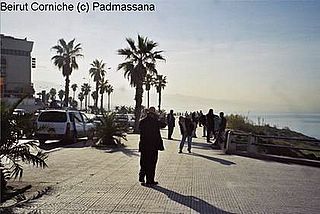 We finished up in Beirut and first visited the
famous Corniche that runs by the sea, the place to be seen in the
1970's but now a bit tatty. Then down to Martyrs square which
is the start of the “Green Line” that divided east and
west Beirut during the war. The buildings directly on the line
have been rebuilt or restored, but you only have to go a street
or so east or west to find the evidence of 15 years of war.
We finished up in Beirut and first visited the
famous Corniche that runs by the sea, the place to be seen in the
1970's but now a bit tatty. Then down to Martyrs square which
is the start of the “Green Line” that divided east and
west Beirut during the war. The buildings directly on the line
have been rebuilt or restored, but you only have to go a street
or so east or west to find the evidence of 15 years of war.
Beirut is on an extremely high state of alert. There are tanks
and armed police and army all over the place – they are expecting
something to happen. The bars and clubs in the city that last
year were packed have been cancelling New Years eve parties as
nobody is buying tickets. The city dwellers do not want to be in
a place with a large crowd that would be a target for the next
bomb. But having said that Beirut is a nice place, the people are
extremely welcoming, there are lovely shops and cafes and I'm
really glad to have visited.

 I was part of an organised tour of the Lebanon and
there were 10 of us. We left Beirut on Xmas day and headed south
via the Corniche to the port city of Sidon. On the way we passed
near to the sports complex behind which there are massive Shatila
and Shabra Palestinian refugee camps, where the massacres in the
1980's happened. In Sidon we visited the Caravanserai where
there is a collection of photographs showing the hours leading up
to and the assassination of president Hariri in February 2005;
the devastation from the 350kg car bomb has to be seen to be
believed.
I was part of an organised tour of the Lebanon and
there were 10 of us. We left Beirut on Xmas day and headed south
via the Corniche to the port city of Sidon. On the way we passed
near to the sports complex behind which there are massive Shatila
and Shabra Palestinian refugee camps, where the massacres in the
1980's happened. In Sidon we visited the Caravanserai where
there is a collection of photographs showing the hours leading up
to and the assassination of president Hariri in February 2005;
the devastation from the 350kg car bomb has to be seen to be
believed.


 would be “Don't climb the
ramparts” signs and a huge big fence to stop you, not in
Lebanon, go where you like and we did.
would be “Don't climb the
ramparts” signs and a huge big fence to stop you, not in
Lebanon, go where you like and we did.
 We spent the night in an Hermitage called St
Elysee, whose back wall is actually the rock of the mountain
behind. To get to the place we had to go down a steep mountain
road that was a sheet of ice – which was exhilarating, but the
next day we had to come out by the same way and ended up using
snow chains and taking runs at bends to get round them. We were
also supposed to do a walk here, but were forewarned about the 12
inches of mud and 2 ft of snow by another group that had tried
the walk and had to give up. Instead we went to Byblos for lunch
and then down to Jeita Grotto, a fantastic series of caves which
were brilliant. After the caves we went to Jounie and got the
cable car and funicular up to the top of the hill behind the
town, which has a giant statue of the Virgin Mary, but we just
made it for sunset.
We spent the night in an Hermitage called St
Elysee, whose back wall is actually the rock of the mountain
behind. To get to the place we had to go down a steep mountain
road that was a sheet of ice – which was exhilarating, but the
next day we had to come out by the same way and ended up using
snow chains and taking runs at bends to get round them. We were
also supposed to do a walk here, but were forewarned about the 12
inches of mud and 2 ft of snow by another group that had tried
the walk and had to give up. Instead we went to Byblos for lunch
and then down to Jeita Grotto, a fantastic series of caves which
were brilliant. After the caves we went to Jounie and got the
cable car and funicular up to the top of the hill behind the
town, which has a giant statue of the Virgin Mary, but we just
made it for sunset.
 We finished up in Beirut and first visited the
famous Corniche that runs by the sea, the place to be seen in the
1970's but now a bit tatty. Then down to Martyrs square which
is the start of the “Green Line” that divided east and
west Beirut during the war. The buildings directly on the line
have been rebuilt or restored, but you only have to go a street
or so east or west to find the evidence of 15 years of war.
We finished up in Beirut and first visited the
famous Corniche that runs by the sea, the place to be seen in the
1970's but now a bit tatty. Then down to Martyrs square which
is the start of the “Green Line” that divided east and
west Beirut during the war. The buildings directly on the line
have been rebuilt or restored, but you only have to go a street
or so east or west to find the evidence of 15 years of war.
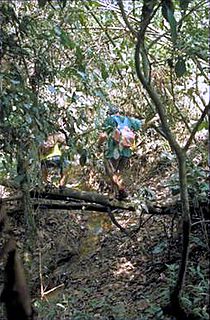 shoulders. Then we burst upon it. It was only a
small ravine, a twenty-foot drop to a rocky bottom, where, in the
wet season the tiny stream would swell into a fast flowing angry
river. The streamlet travelled between large sharp rocks and
seemed to be willing me to fall.
shoulders. Then we burst upon it. It was only a
small ravine, a twenty-foot drop to a rocky bottom, where, in the
wet season the tiny stream would swell into a fast flowing angry
river. The streamlet travelled between large sharp rocks and
seemed to be willing me to fall.
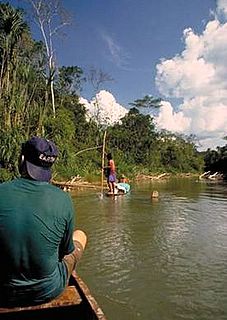 I was not long back from doing the same in New
Zealand. He had heard that I was planning a journey to somewhere
in the back of beyond of the Amazon Basin and as we both like
living on the edge, so we teamed up, thinking “what the
hell, let's do it.” Adam was thirty something, fit, and
spoke fluent Spanish; I was fifty something, not so fit and spoke
fluent Portuguese.
I was not long back from doing the same in New
Zealand. He had heard that I was planning a journey to somewhere
in the back of beyond of the Amazon Basin and as we both like
living on the edge, so we teamed up, thinking “what the
hell, let's do it.” Adam was thirty something, fit, and
spoke fluent Spanish; I was fifty something, not so fit and spoke
fluent Portuguese.
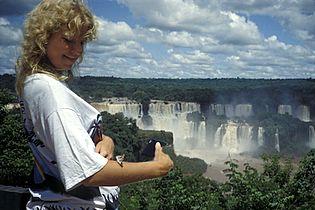 So Adam and I went off
into the depths of the green rainforest and our story of
frustrations and successes have been written down and seen in
various articles, slide shows, for the Globetrotters Club and
others. To this day we are still good friends having survived the
'Urban Jungle' as well as the 'Amazon jungle'.
So Adam and I went off
into the depths of the green rainforest and our story of
frustrations and successes have been written down and seen in
various articles, slide shows, for the Globetrotters Club and
others. To this day we are still good friends having survived the
'Urban Jungle' as well as the 'Amazon jungle'.
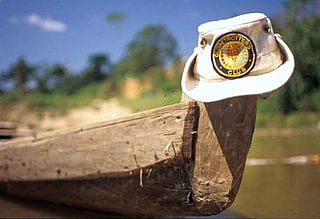 I have met and I'm sure I will still meet
some wonderful and life long friends in my time at the
Globetrotters Club. So thanks to them, some good nights in the
pub with Dick and with the members – Good conversation after the
'Slide Talks' have finished – My independent travelling
days are not yet over, with the help of all my vitamins, I will
continue to roll around this exciting world, either with or
without a travelling companion from our great Globetrotters Club.
I have met and I'm sure I will still meet
some wonderful and life long friends in my time at the
Globetrotters Club. So thanks to them, some good nights in the
pub with Dick and with the members – Good conversation after the
'Slide Talks' have finished – My independent travelling
days are not yet over, with the help of all my vitamins, I will
continue to roll around this exciting world, either with or
without a travelling companion from our great Globetrotters Club.